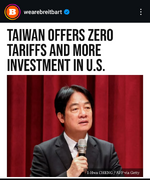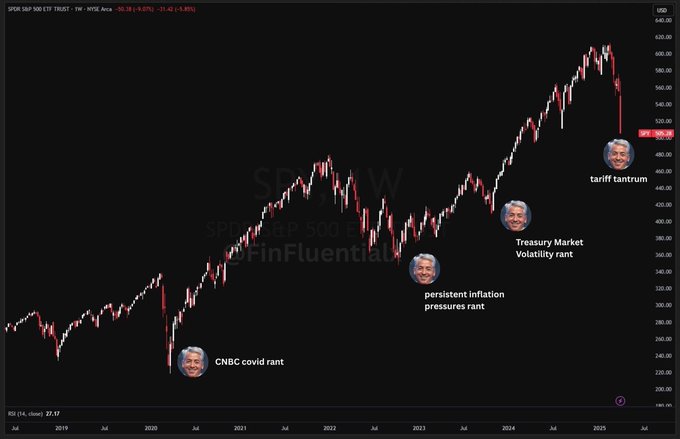You are using an out of date browser. It may not display this or other websites correctly.
You should upgrade or use an alternative browser.
You should upgrade or use an alternative browser.
The Trump tariffs
- Thread starter scary_robot_music
- Start date
What you are saying is true only in a world of perfect competition. The reality is the market concentration in most industries in the USA has been steadily increasing for decades and with this the profit margin and return on equity (even including non-software companies) of major corporations has risen over time. There is less competition now and companies have more pricing power than than they did 30 years ago so a lot of the cost savings will just be absorbed by the companies as higher profit margins rather than passed onto consumers. Not just that but concentration of cross ownership has risen. If for example Blackrock, Vanguard, State Street and Fidelity combined control 25% of the voting rights of shares in a company in the S&P 500 and control a similar percentage of voting rights in its competitor behind the scenes they will be pushing to make sure competition is gentlemanly and no price wars etc break out between competitors.Not necessarily. Imagine for example that it costs $1,000 to produce a computer. And automation reduces that cost to $800. Those $200 of savings can be passed on to the consumer. The consumer will then take those $200 he would have spent on the computer, and buy something else, for example some nice handmade shoes.
On top of this large swathes of the American economy are now owned by private equity and they have a very short term extractive focus of raising prices and cutting costs (through worse customer service) because they don't care about what happens to the company 50 years from now. A classical old time entrepreneur often wants to build a business they can pass onto their grand-kids so they want things to be sustainable whereas private equity just wants to gauge their customers and if the company fails 10 years later it doesn't matter if they already made their return.
The government greenlighting things is only one step in the process.There are absolutely states in the union who will green light these factories faster than 5-10 years.
For a corporation in the S&P 500 most of them are so slow moving it would take them a year just to submit a plan to the government between the board of directors having meetings and commissioning feasibility studies to even decide to build a factory in the USA, where it should get built, organising financing, etc.
Then even if the government approves the plans quickly (say 6 months) with all the building regulations and safety and labour standards in the USA any mega-factory won't get built in anything under 2 years from the date of approval.
For example the Tesla giga factory in Texas was announced in November 2019 and the first model Y rolled off the assembly line in August 2021. Basically 2 years. But how many years did it take before that for Tesla to decide to build a factory then choose a location for it, get approval, etc? You can see generally in the USA 5 years is generally considered quick turnaround from when a CEO gets the idea in his head to build a factory in the USA to the point where the factory creates its first product that is usually a 5 year process. In China that could be a 2 year process.
The problem is not everybody can do highly skilled highly specialized jobs. Not everybody is capable of that. I am fairly certain in 30 years time unemployment will be much higher than today.I don't think we have to redistribute money in the form of a dole or a guaranteed minimum income, paying people to sit around while we tax the people who work.
Even if current jobs become obsolete, there are still things people can do that generate value. There probably needs to be protection and subsidies for some industries, but the goal should be to provide private sector jobs for people, not to create generational welfare recipients or armies of government bureaucrats.
It's not about taxing the people who work, its about taxing the profits of the mega corporations or taxing consumption to pay for welfare. I am not making a judgement if that is good or bad but rather I am making the judgement that it is what is most likely to happen to avoid societal collapse.
Being reliant on the government to survive sounds like a potential nightmare.
Oh, you didn't take the latest jab or posted something "racist" on social media?!? No more UBI for you! And now we must take your children since you can no longer provide for them.
It reminds me of something from the end times prophecies.
Oh, you didn't take the latest jab or posted something "racist" on social media?!? No more UBI for you! And now we must take your children since you can no longer provide for them.
It reminds me of something from the end times prophecies.
Yep. That is why you need to make enough money to retire in the next few years before everything goes to shit.Being reliant on the government to survive sounds like a potential nightmare.
Oh, you didn't take the latest jab or posted something "racist" on social media?!? No more UBI for you! And now we must take your children since you can no longer provide for them.
It reminds me of something from the end times prophecies.
Most Financial News correlating with Political News are junk like few had mentioned earlier in the thread - risk on assets are expected to be volatile from sentiment anyways. Bonds on the other hand...
There's speculation bond (risk off) selling off by Japanese holders had spooked Trump to hold back on the trade war.

 news.sky.com
news.sky.com
There's speculation bond (risk off) selling off by Japanese holders had spooked Trump to hold back on the trade war.

Donald Trump has finally blinked - but it's not the stock markets that have forced him to act
The US president had brushed off the sour equity market reaction to his tariffs as being akin to "medicine" that had to be taken. But, as ever, it is the bond markets that have forced Mr Trump to blink.
Attachments
Last edited:
I've been doing this for a while with my clothes and shoes etc. Less stuff but higher quality and timeless cuts.I have a pair of US-made New Balance gym shoes. They weren't ridiculously expensive, something like $120 about ten years ago. I've had them that long and they're still in like new condition. Granted, I don't use them outdoors and only wear them when I lift weights, but the quality is excellent, much better than any shoes I've had that were made in SE Asia.
My hiking shoes and hiking boots were made in Italy. The shoes are made of microfiber and I bout them about a year ago. The boots are leather and I've had them around 12 years. They cost something like $350. Both are amazing quality, seems like they'll last for decades. If they can make footwear like that in Italy for a reasonable price, seems like we should be able to make something similar for a similar price in the US.
Granted, the boots I bought over a decade ago, so they were kind of expensive, but not really for leather boots made in Italy that are likely to last my whole life, if you think about it. I get that a 10% or 20% price increase in the cheaper, lower quality SE Asian shoes most people wear will hurt lower income people to some extent, but making shoes in the US doesn't seem like a totally crazy idea to me. In the end, maybe Americans buy shoes less often, pay more, and get better shoes that last longer.
You look better and things last. Way longer than the fast fashion stuff.
That is the first time I have heard of the current prime minister of Singapore. This was his response to the tariff wars. Ignore the awful clickbait heading.
He seems intelligent, well spoken and measured in his response. He also seems to have a good understanding of history. I don’t necessarily agree with every single thing he said but overall he seems a lot more sensible than most politicians from other countries.
Do you think they'll lash out? That's what the doomsayers from sites going on predicting that for 20, 10, the last 5 years, etc keep saying.
Zeihan is still predicting that too, like Schiff's BTC prediction. They don't realize that predicting that we'll all die one day isn't a prediction.







